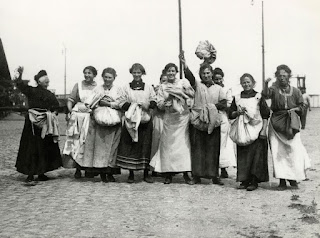Talk about the R project Onze Roeping, on Joyful Militancy – Mercedes Azpilicueta

May 5, 18.30: talk about the project Onze Roeping, on Joyful Militancy
Doors open at 18.30 (with soup), the talk starts at 19.00.
Together with archivist and If I Can’t Dance curator Anik Fournier and Rozenstraat curator Sjoerd Kloosterhuis, Mercedes Azpilicueta will share parts of the process in preparation for the performative walks in July and try to answer questions such as, what are the affective elements lying underneath the Aardappeloproer, if we consider that ‘tenderness and vulnerability can thrive alongside these militant commitments? And why is joyfulness an important part in these political commitments?
Alongside these questions the conversation will also look deeper into the architectural and material conditions in the Jordaan where this matriarchal organisation was born as well as the aesthetics and imaginaries of representations of women in uprisings such as Ni Una Menos where Mercedes has been taking part since 2015 and in the Jordaan in the aftermath of the riots.
More information Onze Roeping, on Joyful Militancy
Women have fought several times in history for the rights of the working class, despite the engendered assumption that they had no contribution to society besides their capacity – and often the obligation – to procreate. During critical situations such as the World Wars and the Spanish Flu, where the scarce resources were distributed to the ‘productive’ part of the population, women stood up and formed a collective body performing a strong political gesture of care. The resulting jolt was an encouraging example of solidarity and hope for the part of the population facing repression and lack of social justice.
With a focus on the Aardappeloproer (1917), one of the leading historical revolts of the early 20th century, the research will examine the importance of these movements in promoting solidarity and answering questions such as: What are the affective elements lying underneath this event, if we consider that tenderness and vulnerability can thrive alongside these militant commitments? How have domestic economies evolved and what is the role of the public space in it? How did the daily private discussions between women become slogans and street songs in upheavals, making visible what has been silenced? How can an individual body become plural when performing? How can a collective movement keep the intimacy of a domestic relationship? The trans-historical approach of public interventions and women’s activist militancy, today relevant more than ever, reflects on current social movements and grass-root feminist initiatives such as #NiUnaMenos ‘No One [Woman] Less’ in today’s Argentina.
Onze Roeping, on Joyful Militancy is initiated by ROZENSTRAAT curator Sjoerd Kloosterhuis and Mercedes Azpilicueta in 2019 and is developed in close collaboration with Mieke Krijger, director of the Jordaan Museum.